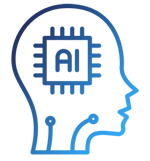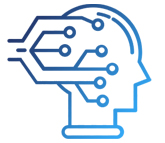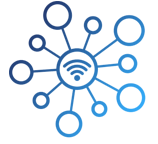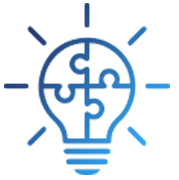- AI

Artificial Intelligence

Smart Products & Services
We follow Smart Products & Services

Intelligent Business Functions & Processes
We follow Intelligent Business Functions & Processes

Robotic Process Automation
We follow Robotic Process Automation

Personalized
healthcareWe follow Personalized healthcare

Identifying at-risk patients
We follow Identifying at-risk patients

Optimized routing and scheduling
We follow Optimized routing and scheduling
- ML

Machine Learning

Predictive
AnalyticsWe follow Predictive Analytics

Service Personalization
We follow Service Personalization

NLP
We follow NLP (Natural Language Processing)

Stock Market Forecasting
We follow Stock Market Forecasting

Fraud Prevention
We follow Fraud Prevention

Recommender engines
We follow Recommender engines
- blockchain
- IOT

Internet of Things
- AR
- Business Solutions

Business Solution

Business Performance Management
We follow Business Performance Management

Decision Making & Big Data Analytics
We follow Decision Making & Big Data Analytics

Enterprise Data Management
We follow Enterprise Data Management
- Apps

Apps

Native Apps
We follow Native Apps

Cross Platform Apps
We follow Cross Platform Apps

Web Apps
We follow Web Apps

Hybrid Apps
We follow Hybrid Apps

Cloud Native Apps
We follow Cloud Native Apps
- Lab

6 Blockchain Use Cases in Healthcare Industry
Blockchain is one of the most leading technologies that has taken the world by storm. Blockchain has completely transformed the way many sectors work, providing solutions to complex problems. Blockchain technology is now being used all over the world over many web and mobile applications. It provides modern solutions like advanced record keeping and sharing, an online transaction using a payment gateway, and various other features. Large companies are now relying on this technology and applications are being created enabling Blockchain technology so that blocks of data are secured from others access. It has made a great impact on the healthcare industry and has given ways to perform different operations.
In this article, you are going to learn about the use of cases of Blockchain technology in the healthcare industry.
1. Improved Medical Record Access

The blockchain healthcare projects institutions contain a large amount of data making the domain of healthcare record management the most important in Blockchain technology. It focuses on data sharing across stakeholders of healthcare, preserving sources, maintaining records and keeping the data secure. Powerful data analysis is done using these records from the population which provides beneficial health analytics in various ways. The patient’s data access is governed by smart contracts applying different rules so that no other user can access the data of a patient. Patients can allow to whom their data should be shared for research purposes, or even the data can be completely transparent. Moreover, by implementation of blockchain in healthcare, patients can also share their data with the doctors making the treatments effective.
2. Medical Professional Credentialing and Licensing

There are management processes for the workforce competencies of healthcare including degree verification, continuing education and credentialing. Criminal acts are conducted and information is misused in the name of false degree and transcripts which results in great loses. Thus, the medical professional credentialing and licensing can be of great use as it removes the risk of false degrees and misrepresentation of information on applications. The threats become dual when it comes to the data and safety and patients, so it is crucial to use blockchain in healthcare today to verify degrees, certificate, licenses, qualifications, training and employment history of the doctors. Medical credentialing of the staff and doctors, physicians were time-consuming but Blockchain removed the barrier of it using its powerful custom software development technology.
3. Improved Clinical Trial Management

Blockchain is the perfect fit to solve the problem of clinical trial management. There are many benefits of using this powerful technology in clinical trial management including moving the stakeholders to a distributed network eliminating the need for intermediaries. This trial management domain fully uses all the awesome features of Blockchain technology like transparency, immutability disintermediation, trust and audibility. This trial process is expensive and involves a wide range of stakeholders but using Blockchain technology it helps the trial sponsors, investigators, patients, administrators, review board and other regulatory authorities. After the identification of mobile app development agency involved in the process of a clinical trial, then the challenges are identified and Blockchain solutions are mapped using the fit-for-purpose approach.
4. Advance Biomedical Research

The best blockchain technology company has the potential to handle all challenges in the field of healthcare. The main issue that arises in this field is about data sharing, data privacy, data integrity, data provenance and consent. Blockchain technology has overcome all these challenges to a great extent, hence allowing the transparency, accessibility, mobilization and reproducibility. Blockchain systems offer easily accessible trials of audit and immutable data. Hybrid systems have used that act as both public and private chain for the biomedical data use cases. In biomedical research, the data is retrieved from many sources from labs or between the labs. In research, data authenticity is proved and a full history is shown with each data point and the time of data analysis.
5. Modernize Pharmaceutical Supply Chain

In this globalization era, the supply chain now covers many countries, products and actors. Pharmaceutical supply chains are characterized by fragmentation and complexity. It includes different actors who participate in the supply chain of a drug such as the wholesalers, logistic providers, manufacturers, repackages, hospitals, regulators and pharmacies and patients. These involve trade partners across different countries that subject to a different trade, legal and regulatory regimes. Within the health supply chain, breakdowns in management, safety, quality and authenticity are of serious concern for the public health. Blockchain addresses many pharmaceutical supply chain challenges developing solutions that enable trust and verify the supply chain data and identity fake medicines through great visibility. Blockchain uses sensitive and confidential supply chains and data is validated.
6. Entering The Genomics Age

The personal sequencing of the genome has made it affordable to many people using next-level DNA sequencing technologies. Drug development and genomic data-driven medicines are made possible due to these unpredicted advancements made to the field. There is an increase in the genetic testing of direct to consumer and delay in this transformation is due to the adoption of lagging consumer of genome sequencing. Blockchain in healthcare introduction made more accessible and various approaches have been explored which popularize genome sequencing. Blockchain technology has helped to catalyse the genomics data revolution by reducing the cost of personal genome sequencing, genomic data ownership democratized and transparent sharing of genomic data is done. Blockchain within healthcare facilitates decentralized networks and enables participants to exchange the data.
Conclusion
Blockchain has provided modern solutions to problems that were previously not able to be solved. Blockchain has affected many sectors including the healthcare industry. There are great benefits of blockchain in healthcare as it has handled many healthcare-related issues. The predictive models of privacy preservation used in healthcare blockchain companies and it has enabled the most secure record-keeping and sharing of patient’s data. Blockchain also enables the medical professional credentialing and licensing so that degrees, certificates of doctors and staff can be verified. Blockchain has also improved clinical trial management and has advanced the way biomedical researches are done. It also modernized the pharmaceutical supply chain with the help of Blockchain entering in the genomic age is made easy.
Also Read: 5 Best Blockchain Applications That Would Transform Your Business



















































Leave a Reply